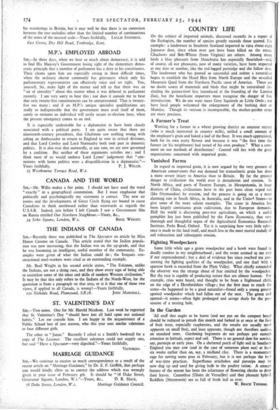M.P.'s EMPLOYED ABROAD
SIR,—In these days, when we hear so much about democracy, it is odd to find His Majesty's Government losing sight of the elementary demo- cratic principle that a member of parliament has a duty to his constituents. Their claims upon him are especially strong in these difficult times, when the ordinary elector commonly has grievances which only his parliamentary representative can effectively voice and set right. You, yourself, Sir, make light of the matter and tell us that there was an " air of unreality " about this matter when it was debated in parliament recently. I am very sorry to hear this ; nor does it console me to hear that only twenty-five constituencies can be unrepresented. That is twenty- five too many ; and if an M.P.'s unique specialist qualifications are really so indispensable that the government must avail itself of them, surely so eminent an individual will easily secure re-election later, when the present emergency comes to an end.
It is especially undesirable for a diplomatist to have been closely associated with a political party. I am quite aware that there are nineteenth-century precedents, that Gladstone saw nothing wrong with asking an Ambassador to return to England to vote in critical divisions, and that Lord Cowley and Lord Normanby both took part in domestic politics. It is also true that outwardly, at any rate, we are now governed by a coalition. But neither of these arguments satisfies me ; and I think most of us would endorse Lord Lyons' judgement that "con- nexions with home politics were a disqualification in a diplomatist."—


























 Previous page
Previous page